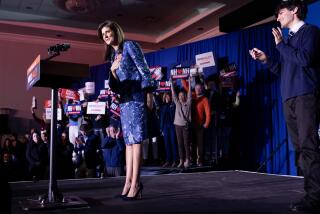New England’s Appeal Not Equal to the Sum of Its Delegates
- Share via
BOSTON — GOP front-runner George W. Bush last graced the soil of Massachusetts in September, and before that, in June. “It’s hard to justify much more when there are so many larger states at stake,” said Rob Gray, executive director of Bush’s Republican primary campaign effort in Massachusetts.
By contrast, Sen. John McCain of Arizona has visited each of the five New England states that vote Tuesday at least once. In addition, he has invested $2 million on television advertising in Massachusetts, said his New England campaign director, Mike Dennehy.
Still, the biggest question about New England, where McCain appears to have a solid lead, is whether this proud region matters at all in this odd campaign year.
Look on the map and you see a clump of small states, none with a population to make the Census Bureau swoon. But as voters in Maine, Massachusetts, Vermont, Rhode Island and Connecticut prepare to cast primary ballots next week, the cluster effect of 102 Republican delegates--one more than New York state--and 207 on the Democratic side makes New England a statistical trophy for any presidential candidate.
“I would look at New England as a very important region,” said Bob Watson, a Republican state representative in Rhode Island who is running McCain’s campaign there. McCain aides say that, besides California, they are concentrating their efforts for next week’s voting on New England, New York and Ohio.
But the fact that New England is broken into five states makes its appeal questionable, said Gray, the top advisor to Massachusetts Gov. Paul Cellucci. “If New England were one big state instead of five, the campaigns would pay a lot more attention,” he added.
McCain Holds Large Lead Across Region
McCain’s message seems to play well in New England and his strategy so far has paid off, giving him a 62% lead in Massachusetts over Bush’s 27%, according to a Boston Herald poll this week. Elsewhere in New England, McCain held a comparable edge, polls showed.
Among Democrats, with an almost 2-to-1 lead in polls released Tuesday over former Sen. Bill Bradley, Vice President Al Gore planned a major rally Saturday in Boston. Bradley’s Massachusetts chairman, James Shannon, said his candidate “has been here a lot: As he came through to New Hampshire, we grabbed him and shanghaied him.”
All the candidates have benefited from what their aides call a New Hampshire spillover effect. With so much media attention concentrated on the Granite State’s first-in-the-nation primary, candidates are guaranteed high exposure in a region dominated by one major newspaper, the Boston Globe, and connected by an areawide cable TV network.
The region that spans the Canadian border to just outside New York City and is home to 13.5 million people boasts a distinctive political sensibility.
Starting with John Adams and his son John Quincy Adams, New England has been a presidential breeding ground. Consistently over the centuries, its senators and congressmen have had a presence in Washington disproportionate to their constituents’ numbers, said former Massachusetts Gov. Michael S. Dukakis, the unsuccessful Democratic candidate for president in 1988.
“The region keeps producing some really extraordinary people,” said Dukakis, who teaches public policy at UCLA. Dukakis also observed that “Massachusetts in particular and New England in general produces more political operatives per square foot than any place in the country.”
Politics is a kind of regional obsession in New England, right up there with the Red Sox, Dukakis continued. “Here,” he lamented, “when I talk about candidates ringing doorbells, my students don’t know what I’m talking about.”
A Moderate Area That Loves Mavericks
Because New England also is the country’s most consistently moderate region, the area offers a good test of how different messages will sell among voters, said Darrell West, a professor of political science at Brown University. Most of the region’s legislatures are closely divided between Democrats and Republicans who tend, in turn, to sing remarkably similar philosophical tunes. Republicans such as former New Hampshire Sen. Warren B. Rudman, a key McCain supporter, and Maine Sens. Olympia J. Snowe and Susan Collins might well qualify as Democrats elsewhere in the country.
In many respects, West pointed out, “New England is as idiosyncratic politically as the South is.”
New England also loves mavericks, so much so that in the 1976 presidential election, Massachusetts was the only state to vote for Democratic Sen. George S. McGovern. “There’s a stubborn sense of independence here, a tendency to like insurgency,” said Shannon, who hopes Bradley will benefit from this trait.
More likely, it is McCain who will profit from New England’s passion for quirky individualism. In Massachusetts, about 22,000 Democratic voters have reregistered as Independents, who in the Bay State may take a primary ballot from either party. Another 4,000 Massachusetts primary voters have moved from Democrat to Republican. Fifty percent of the state’s voters already are Independents, against 36% Democrats and 13% Republicans.
By rights, New England might seem like a Republican shoe-in for Bush. The Texas governor was born in Connecticut, went to prep school at Phillips Academy in Massachusetts, followed by Yale and the Harvard Business School. His grandfather represented Connecticut in the U.S. Senate. His family has long spent summers at a seaside compound in Maine.
But Gray, of the Bush campaign, predicted that McCain’s significant victory in New Hampshire would help him in the rest of New England. “The Bush campaign didn’t run as hard in New Hampshire,” Gray said, whereas area voters “got a full dose of John McCain at his best.” He added that “because McCain caught on so much with Independents, it’s going to be very tough sledding here for Gov. Bush.”
With a booming economy and a population burgeoning after years of stagnation, New England also claims a high level of education. Religious tolerance is widespread.
Tiny Rhode Island, with only 36 presidential delegates, has the nation’s highest percentage of Catholic voters, said Watson, who suspects Republicans in his state will not take kindly to Bush’s appearance at fundamentalist Bob Jones University in South Carolina, despite his subsequent explanation of the visit.
The region’s occasionally feisty sense of eccentricity also may help Bradley’s flagging presidential effort, said political scientist Linda Fowler, director of the Nelson A. Rockefeller Center for the Social Sciences at Dartmouth College. “People know Bradley up here and they like him,” Fowler said.
Because the region’s five primaries coincide with those in New York and California, New England may enjoy the proverbial 15 minutes of political fame, Fowler said. But any attention will be fleeting, and the five states will swiftly return to their status as something akin to an electoral asterisk, she said. “In terms of the magnitude of what’s going on next Tuesday, New England will get relatively short shrift.”
(BEGIN TEXT OF INFOBOX / INFOGRAPHIC)
The New England Electorate
Source: Almanac of American Politics, 2000
More to Read
Get the L.A. Times Politics newsletter
Deeply reported insights into legislation, politics and policy from Sacramento, Washington and beyond. In your inbox twice per week.
You may occasionally receive promotional content from the Los Angeles Times.










